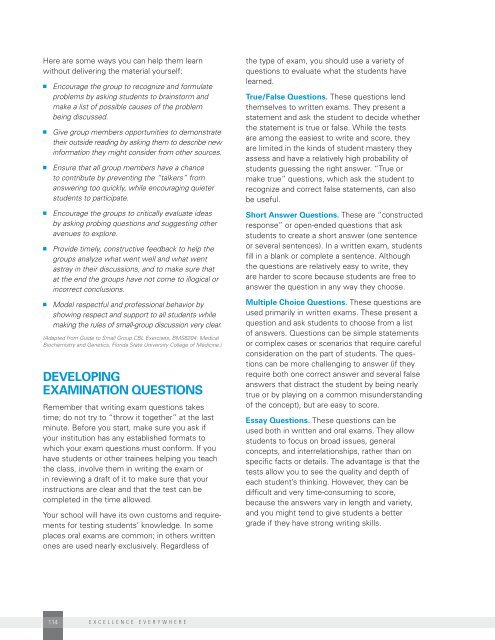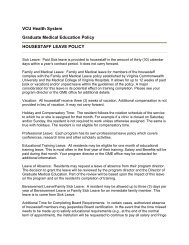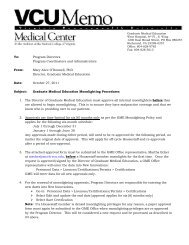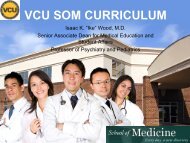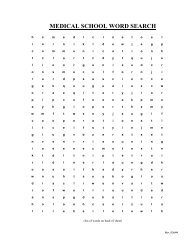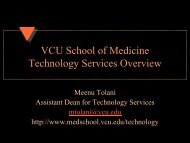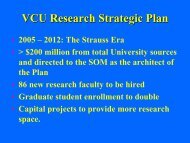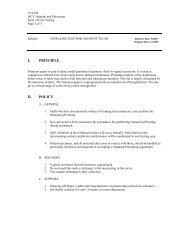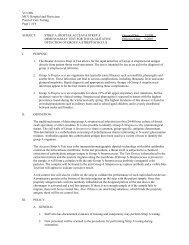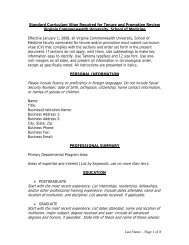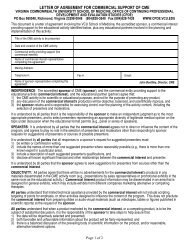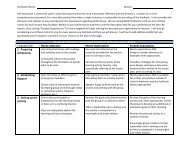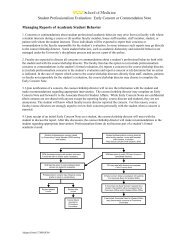Here are some ways you can help them learnwithout delivering the material yourself:n Encourage the group to recognize and formulateproblems by asking students to brainstorm andmake a list <strong>of</strong> possible causes <strong>of</strong> the problembeing discussed.n Give group members opportunities to demonstratetheir outside reading by asking them to describe newinformation they might consider from other sources.n Ensure that all group members have a chanceto contribute by preventing the “talkers” fromanswering too quickly, while encouraging quieterstudents to participate.n Encourage the groups to critically evaluate ideasby asking probing questions and suggesting otheravenues to explore.n Provide timely, constructive feedback to help thegroups analyze what went well and what wentastray in their discussions, and to make sure thatat the end the groups have not come to illogical orincorrect conclusions.n Model respectful and pr<strong>of</strong>essional behavior byshowing respect and support to all students whilemaking the rules <strong>of</strong> small-group discussion very clear.(Adapted from Guide to Small Group CBL Exercises, BMS6204: MedicalBiochemistry and Genetics, Florida State <strong>University</strong> College <strong>of</strong> Medicine.)DevelopingExamination QuestionsRemember that writing exam questions takestime; do not try to “throw it together” at the lastminute. Before you start, make sure you ask ifyour institution has any established formats towhich your exam questions must conform. If youhave students or other trainees helping you teachthe class, involve them in writing the exam orin reviewing a draft <strong>of</strong> it to make sure that yourinstructions are clear and that the test can becompleted in the time allowed.Your school will have its own customs and requirementsfor testing students’ knowledge. In someplaces oral exams are common; in others writtenones are used nearly exclusively. Regardless <strong>of</strong>the type <strong>of</strong> exam, you should use a variety <strong>of</strong>questions to evaluate what the students havelearned.True/False Questions. These questions lendthemselves to written exams. They present astatement and ask the student to decide whetherthe statement is true or false. While the testsare among the easiest to write and score, theyare limited in the kinds <strong>of</strong> student mastery theyassess and have a relatively high probability <strong>of</strong>students guessing the right answer. “True ormake true” questions, which ask the student torecognize and correct false statements, can alsobe useful.Short Answer Questions. These are “constructedresponse” or open-ended questions that askstudents to create a short answer (one sentenceor several sentences). In a written exam, studentsfill in a blank or complete a sentence. Althoughthe questions are relatively easy to write, theyare harder to score because students are free toanswer the question in any way they choose.Multiple Choice Questions. These questions areused primarily in written exams. These present aquestion and ask students to choose from a list<strong>of</strong> answers. Questions can be simple statementsor complex cases or scenarios that require carefulconsideration on the part <strong>of</strong> students. The questionscan be more challenging to answer (if theyrequire both one correct answer and several falseanswers that distract the student by being nearlytrue or by playing on a common misunderstanding<strong>of</strong> the concept), but are easy to score.Essay Questions. These questions can beused both in written and oral exams. They allowstudents to focus on broad issues, generalconcepts, and interrelationships, rather than onspecific facts or details. The advantage is that thetests allow you to see the quality and depth <strong>of</strong>each student’s thinking. However, they can bedifficult and very time-consuming to score,because the answers vary in length and variety,and you might tend to give students a bettergrade if they have strong writing skills.114 excellence everywhere
COURSE DESIGNYou may be asked to design a new course fromscratch, or you may want to redesign an existingcourse to better suit your teaching style andknowledge or advances in your field. Coursedesign is a complex and time-consuming undertaking,so before starting down this path, giveconsiderable thought to how you will find the timeto build the new course, how many times (if any)you will be able to substantially re-teach the samecourse, and whether your new course—especiallyif it is a significant departure from a well-lovedpredecessor’s course—will generate potentiallydamaging turbulence for you from your teachingand research colleagues.n Clarify your department’s expectations for thiscourse. If you are teaching a course for only oneyear and must hand it back to your colleague whenhe returns from a sabbatical, you might want toinvest minimal time and effort. If you can get acommitment to teach the course for several years,revising it will make more sense.n Review and evaluate the course syllabus, lecturenotes, textbooks and other assigned readings,assessment questions, and other materials thefaculty member who previously taught the coursewill make available to you.n Review students’ final exams to learn wherethe course was strong or weak in teaching keyconcepts. If they are available, skim a few years’worth <strong>of</strong> students’ course evaluations.n If possible, ask the faculty member who has beenteaching the course to describe his or her impressions<strong>of</strong> what worked and what did not, or observethis person teaching a class and jot down yourthoughts about what you would keep or change.Determine what Changes to Make. If you dodecide to make changes to the course, figure outwhat and how much you want to change. Are yourpredecessor’s lecture notes written in a style thatis similar to your own way <strong>of</strong> presenting material?If not, spend some time editing the lectures tomake them your own. Is course content basicallygood, but is it presented primarily in lecture formwith few activities that press the students to think?If the content <strong>of</strong> the course seems satisfactoryoverall, you can focus more on your presentation.But if you think it is necessary to introduce asubstantial amount <strong>of</strong> new content or make majorstructural changes, then it may be useful to startfrom the beginning and design a completely newcourse.Designing a New CourseCreating a new course is more difficult andtime-consuming than revising an existing one.Before starting, ask yourself why you want todesign a new course. Has your department orschool requested that you fill a gap in the existingcurriculum? Will you earn good will and be viewedas a team player if you take it on? Do you havea special research interest that is not currentlyrepresented in the curriculum?You will face three critical decisions—what toteach, how to teach it, and how to ensure thatstudents are learning what is being taught. Ideally,you should begin planning your course severalmonths ahead <strong>of</strong> the term to give yourself timeto order textbooks and request other resourcesand to prepare your course handouts. But evenif you are asked to develop a new course at thelast minute, you can still use many <strong>of</strong> the planningguidelines described below.Decide what to Teach. Determine how thecourse relates to other courses in the department’scurriculum by asking these questions:n Will the course be required before students canregister for higher-level courses? If so, talk to theinstructors <strong>of</strong> the advanced courses to see whatkinds <strong>of</strong> knowledge and skills they expect fromstudents who will have taken your course, andmake sure you are covering that material well.n Is it an advanced course? If so, talk to the instructorswho are teaching the basic courses thatstudents will have taken before yours so that youcan better understand what skills and knowledgestudents will have when entering your course.teaching and course design115
- Page 3 and 4:
A R e s o u r c e f o r S c i e n t
- Page 5 and 6:
Table of ContentsVII119PrefaceChapt
- Page 7:
135 Chapter 10E x p a n d i n g Y o
- Page 15 and 16:
Q u e s t i o nq&aWhat Is a “Tenu
- Page 17:
preparing for immediate submission,
- Page 22 and 23:
Practicing the Talkn Practice your
- Page 24 and 25:
your one-on-one interviews you have
- Page 26 and 27:
If talking directly about money is
- Page 28 and 29:
When the institution responds and y
- Page 30 and 31:
equipment and supplies. Maintenance
- Page 32 and 33:
Q u e s t i o nq&aIs your instituti
- Page 34 and 35:
Working With Human SubjectsWhether
- Page 36 and 37:
RESPONSIBILITIES BEYONDTHE LABORATO
- Page 38 and 39:
UNDERSTANDING YOURINSTITUTION AND H
- Page 40:
Criteria for PromotionStructure of
- Page 45 and 46:
Q u e s t i o nWhat’s in a Name?q
- Page 47 and 48:
Screening ApplicantsWhen you review
- Page 50 and 51:
Interpersonal Skillsn How important
- Page 52 and 53:
Multinational Organizations are hir
- Page 54 and 55:
n If there is an office that handle
- Page 57 and 58:
n Seek funding and publish papers (
- Page 59 and 60:
In fact, even though you yourself h
- Page 61 and 62:
n Craft a statement that you feel c
- Page 63 and 64:
n When you delegate authority to so
- Page 65 and 66:
n Use only pens, preferably with wa
- Page 67 and 68:
Strategy sessionsShould you decide
- Page 69 and 70:
Finding Good Papers for Journal Clu
- Page 71 and 72:
If possible, invite people in your
- Page 73 and 74: Q u e s t i o nq&aHow do I avoid po
- Page 75 and 76: The International Committee of Medi
- Page 77 and 78: Managing Conflictin the LabConflict
- Page 79 and 80: steps for dealing with conflictWhen
- Page 81 and 82: chapter 5managing your time“ Succ
- Page 83 and 84: Check your work: the 90-year though
- Page 85 and 86: n Make and keep appointments with y
- Page 87 and 88: n Help them seek advice without tak
- Page 89 and 90: FAMILY MATTERSMany scientists face
- Page 91 and 92: chapter 6project management“ We m
- Page 93 and 94: My project is to get a grant funded
- Page 95: ObjectivesObjectives are the end re
- Page 98 and 99: The key events schedule and the act
- Page 100 and 101: Microsoft Project, a program that s
- Page 102 and 103: Martin, Vivien. Managing Projects i
- Page 104 and 105: appendix II: Example of a Work Brea
- Page 106 and 107: appendix iv: Example of a Gantt Cha
- Page 108 and 109: e h i n d c l o s e d d o o r s :w
- Page 110 and 111: Who might be interested in supporti
- Page 112 and 113: Call your program officerProgram of
- Page 114 and 115: direct costs vs. indirect costsDire
- Page 116 and 117: RESOURCESAllen, Ernest M. “Why ar
- Page 118 and 119: the next generation of students (th
- Page 120 and 121: Seek Feedback through a Formal Peer
- Page 122 and 123: Encouraging Student Questionsn Do n
- Page 126 and 127: n Are there curriculum changes unde
- Page 128 and 129: a relaxed format for talking about
- Page 130 and 131: spend in preparing an effective cou
- Page 132 and 133: The Publishing ProcessTypes of Jour
- Page 134 and 135: A word about impact factorsThe impa
- Page 136 and 137: C r e a t i n g a n i n t e g r a t
- Page 138 and 139: may need to take the first author p
- Page 140 and 141: submitting image filesToday, most i
- Page 142 and 143: Submitting your Paper to Another Jo
- Page 144 and 145: RESOURCESDavis, Martha. Scientific
- Page 146 and 147: increase your impact as a scientist
- Page 148 and 149: Q u e s t i o nq&aHow do I communic
- Page 150 and 151: n Offer criticism and correction in
- Page 152 and 153: It is important to discuss career g
- Page 154 and 155: When Mentoring,Advisory, or Supervi
- Page 156 and 157: For researchers in developing count
- Page 158 and 159: n Is travel safe and convenient, or
- Page 160 and 161: n The expected contribution of each
- Page 162 and 163: Meetings. Set up systems to ensure
- Page 164 and 165: SPECIAL CHALLENGESFOR THE BEGINNING
- Page 166 and 167: e an important connection to future
- Page 168 and 169: The invention of a new method or pr
- Page 170 and 171: licensee, who can charge others for
- Page 172 and 173: Most profound for developing countr
- Page 174 and 175:
Finally, the patents have been chal
- Page 176 and 177:
And, India benefited as a supplier
- Page 178 and 179:
paperwork involved in purchasing1.
- Page 180 and 181:
labeling mattersA case in point: In
- Page 182 and 183:
equipment, freeze-drying equipment,
- Page 184 and 185:
Responsibilityfor materialsIf an or
- Page 186 and 187:
Recent Improvementsin Materials Tra
- Page 188 and 189:
“Knowledge is power.” —Sir Fr
- Page 190 and 191:
MOUMemorandum of UnderstandingRFPRe
- Page 192 and 193:
notes continued182 excellence every
- Page 194:
notes continued184 excellence every


